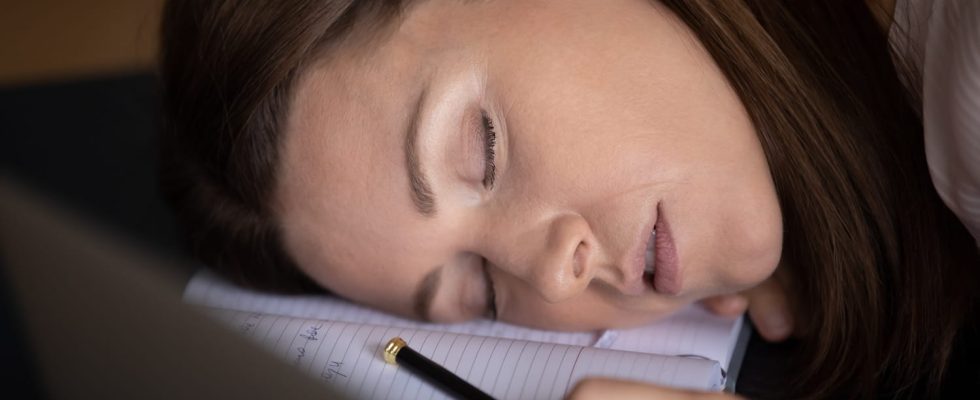Hypersomnia is a sleep disorder characterized by an excessive desire to sleep (during the day, at the cinema, in transport, etc.). What are the causes ? What test to do? What treatment?
Definition: what is hypersomnia?
Hypersomnia means a form of drowsiness whose sleep durations are often much longer than normal. “Today we talk more hypersomnolence or excessive sleepiness which includes an excessive amount of sleep, impaired wakefulness, and an inability to maintain alertness throughout the day”says Dr. Pascale Ogrizek, sleep doctor.
What is idiopathic hypersomnia?
Extremely rare but extremely debilitating, this pathology whose cause is unknown is divided into two types. In the first case, the person needs a very long sleep (more than 11 hours per night) and also feels the need to take very long naps. Moreover, despite the time spent sleeping, his sleep is never restorative. This affects about one person in 10,000. In the second case, the amount of sleep is normal but the sleep is not restorative either and people always complain of wanting to sleep and having to fight against this urge. This concerns one person in 100,000 “In both cases, hypersomnia is characterized by inertia or sleep intoxication upon awakening. Patients say they have a terrible time waking up and their sleep is never restorative.”
What is secondary hypersomnia?
Secondary hypersomnolence “are often caused by depression as people somehow take refuge in sleep“, argues the specialist. Obesity, sleep deprivation, sleep apnea, ADHD or even taking psychotropic, anxiolytic, antidepressant medications, or certain drugs such as cannabis can also cause hypersomnolence.
What is central hypersomnia?
Central hypersomnolence are of neurological origin and are generally caused by narcolepsy type 1 and narcolepsy type 2. Thus, the narcoleptic person always has irresistible bouts of sleep during the day and these short naps are recuperative. The first type presents with cataplexy in 50 to 70% of cases, that is to say a sudden drop in muscle tone usually triggered by emotions. It is often associated with hallucinations and sleep paralysis when falling asleep or waking up. Narcolepsy type 2, on the other hand, does not present with cataplexy and the cause is unclear.
What are the causes of hypersomnia?
There are several causes for this sleep dysfunction:
- An unknown cause (for the case of idiopathic hypersomnia)
- Depression
- Taking certain medications (psychotropics, anxiolytics, anti-depressants)
- Taking certain drugs (cannabis)
- ADHD
- sleep apnea
- Narcolepsy
- Kleine-Levin syndrome East an extremely rare disease whose cause is unknown and which is characterized by episodes of hypersomnia, cognitive and behavioral disorders.
What are the symptoms of hypersomnia?
“The person suffering from hypersomnia complains of being sleepy, of falling asleep more easily than others in monotonous situations (in transport, in meetings, at the cinema). It is often about hyperactive people to fight against the accesses of sleep or this permanent drowsiness. In children, those diagnosed with ADHD, are often children who suffer from sleep apnea and are therefore drowsy. To fight against it, they self-stimulate“, explains Pascale Ogrizek.
When and who to consult in case of hypersomnia?
The specialist advises talking to your doctor first to eliminate simple causes such as lack of sleep or the side effects of medication. If neither of these two causes is responsible for the sleep disorders, it is best to consult a specialized doctor practicing in particular in one of the sleep reference centers in order to receive the correct diagnosis.
What tests and exams to do?
A checkup can be done at a sleep center. There are several ways to diagnose hypersomnia:
► The sleep diary: This consists of noting the times of going to bed, getting up and taking naps each day for 3 weeks to 1 month in order to evaluate the daily average of sleep;
► The Epworth scale: This scale is used to quantify sleepiness. If the score reaches 10 or 11, the patient has pathological somnolence and it is preferable that he go to a doctor to determine the cause;
► Polysomnography: This is an examination carried out on an outpatient basis or in a specialized environment for one or two nights and allowing the recording of sleep in order to detect the cause of drowsiness, in particular sleep apnea syndrome;
► The TILE test: This iterative test makes it possible to know the latency time before each falling asleep. Five naps are scheduled every two hours and the specialists note how long the patient takes to fall asleep and in what stage of sleep he falls;
► Maintenance of wakefulness test (TME): Above all, it makes it possible to quantify the effectiveness of treatments and hypersomnolence in order to authorize or not to drive a car. Unlike the TILE test, patients are installed in semi-darkness and must resist the urge to sleep. Four tests are carried out during the day;
► A blood test for detecting the genetic marker of predisposition to narcolepsy type 1;
► A lumbar puncture: This is the case in some centers. This makes it possible to know whether hypocretin or orexin, the polypeptide neurotransmitter responsible for maintaining alertness, has been destroyed by an autoimmune reaction. In which case, this would signify the diagnosis of narcolepsy type 1.
What treatment to cure hypersomnia?
“You should know that there is no cure for hypersomnia: there is no treatment for the cause in the case of narcolepsy or even in the case of idiopathic hypersomnia because its cause is not known either. The proposed treatments are therefore essentially alertness stimulants.” The best known and oldest is modafinil. This is only issued in specialized centers and has a duration of action of 4 to 5 hours. Methylphenidate, also proposed in cases of ADHD, can also be prescribed in the case of hypersomnia. Finally, more recently, the wakix has a duration of action that extends over the whole day and is also anti-cataplexy.
Thanks to Dr. Pascale Ogrizek, sleep doctor.
